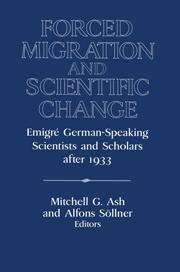Book contents
- Frontmatter
- Introduction: Forced Migration and Scientific Change after 1933
- PART ONE PHYSICAL AND MEDICAL SCIENCES
- PART TWO PSYCHOLOGY, PSYCHONALYSIS, PEDAGOGY
- PART THREE SOCIAL SCIENCES
- 8 Dismissal and Emigration of German-Speaking Economists after 1933
- 9 Emigration of Social Scientists' Schools from Austria
- 10 The Vienna Circle in the United States and Empirical Research Methods in Sociology
- 11 From Public Law to Political Science? The Emigration of German Scholars after 1933 and Their Influence on the Transformation of a Discipline
- Epilogue: The Refugee Scholar in America: The Case of Paul Tillich
- Index
9 - Emigration of Social Scientists' Schools from Austria
Published online by Cambridge University Press: 05 January 2013
- Frontmatter
- Introduction: Forced Migration and Scientific Change after 1933
- PART ONE PHYSICAL AND MEDICAL SCIENCES
- PART TWO PSYCHOLOGY, PSYCHONALYSIS, PEDAGOGY
- PART THREE SOCIAL SCIENCES
- 8 Dismissal and Emigration of German-Speaking Economists after 1933
- 9 Emigration of Social Scientists' Schools from Austria
- 10 The Vienna Circle in the United States and Empirical Research Methods in Sociology
- 11 From Public Law to Political Science? The Emigration of German Scholars after 1933 and Their Influence on the Transformation of a Discipline
- Epilogue: The Refugee Scholar in America: The Case of Paul Tillich
- Index
Summary
INTRODUCTION
As indicated by the title of this book, “Forced Migration and Scientific Change,” I shall not discuss the normal case of scientific change - what the internal view would refer to as “cognitive progress” - but scientific change at the social as well as institutional levels. The discussion focuses on three aspects. First, I will concentrate on the forms of scientific systems that existed in the different German-speaking countries before their governments drove many scientists into exile; in this case, the analysis will look at the changes that science and scientific systems underwent in the wake of this “output” of émigrés, and thus assess the situation in terms of social and/or cognitive “losses.” A second approach will focus on the cohort of émigrés and investigate the changes that individuals, scientific schools, or - if evidence for this can be furnished - whole disciplines underwent during the process of emigration. Generally, the level of aggregation of such an analysis will be relatively low - that is, close to the individual. A third course - practically inverse to the first approach - will focus on the changes disciplines and scientific systems experienced in those countries that assimilated larger numbers of émigrés. An analysis of the “input” will be conducted under the heading of “gains.”
- Type
- Chapter
- Information
- Forced Migration and Scientific ChangeEmigré German-Speaking Scientists and Scholars after 1933, pp. 198 - 223Publisher: Cambridge University PressPrint publication year: 1996
- 3
- Cited by



